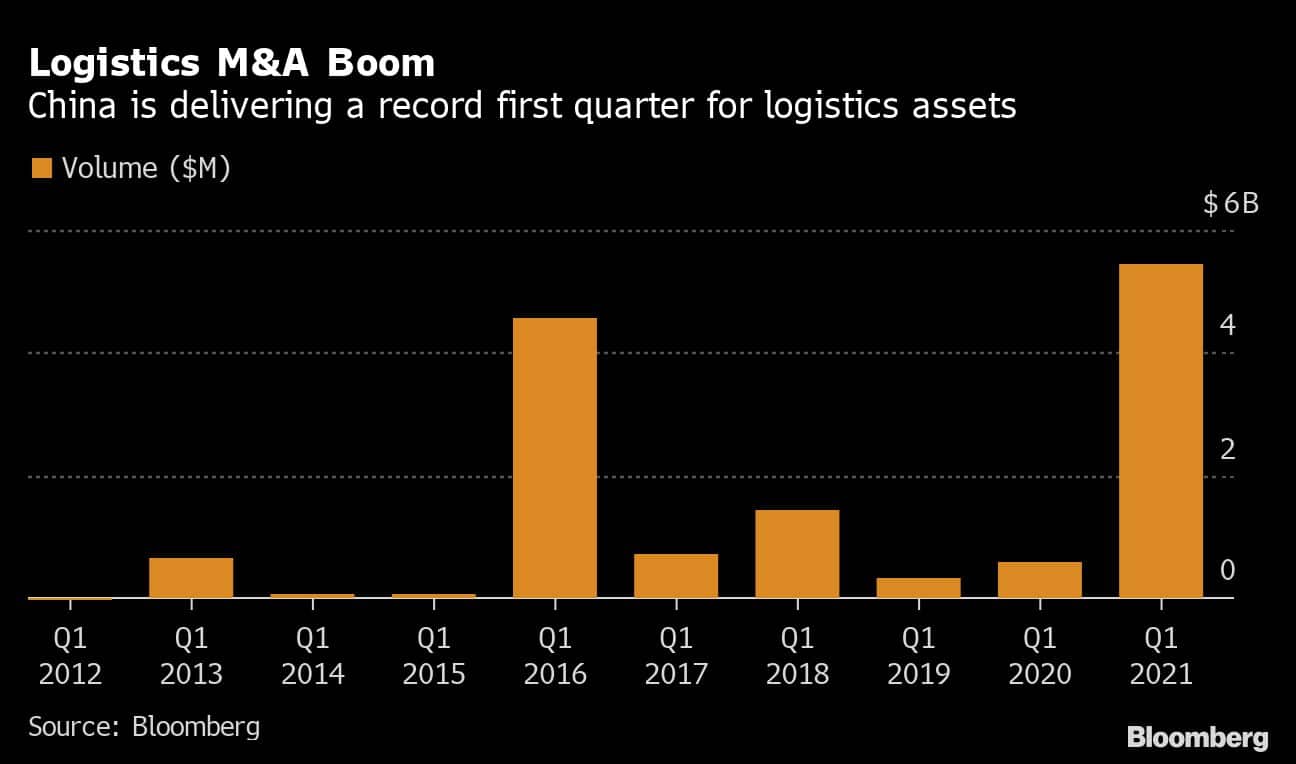No products in the cart.
PE firms are feasting on China’s $5.5 billion logistics M&A
Deals targeting logistics companies in China have delivered the best start to the year on record, generating bumper profits for private equity firms.
About $5.5 billion worth of acquisitions of Chinese logistics firms have been announced so far this year, the strongest first quarter ever, according to data compiled by Bloomberg. Warburg Pincus LLC and MBK Partners are among the firms that have recently profited from selling their stakes in companies in the red-hot sector.

Buyout firms have been betting heavily on assets like warehouse space well before China’s increasingly affluent consumers joined the shift toward e-commerce, which was turbo-charged by the coronavirus pandemic. Even after these latest transactions, dealmakers see investment in Chinese logistics assets continuing to rise.
“We’re seeing an increase in valuation for logistics properties, particularly in higher growth areas around China’s first-tier cities,” said Justin Wai, a Hong Kong-based managing director of real estate at Blackstone Group Inc. “This is a reflection of the underlying strength of the warehouse leasing market as well as demand from e-commerce.”
Blackstone began investing in logistics more than a decade ago, driven by conviction that e-commerce trends would spur the need for warehouses. Logistics is now the firm’s largest exposure overall, comprising more than a third of its real estate portfolio globally.
Time to exit
Warburg Pincus, one of the biggest modern warehousing investors in Asia, capitalized early on its long-term investment in Chinese logistics. The firm reaped a return of more than 10 times on its investment in ESR Cayman Ltd., said a person familiar with the matter, after the company went public in Hong Kong in 2019. Last year, Warburg reduced its stake to less than 5%.
The firm has also invested in New Ease China, which focuses on shipments through China’s airports and urban hubs, and Beijing Yunniao Technology Co., a short-haul logistics platform that matches shippers and truckers, according to Warburg Pincus’ website.
The pandemic has helped spark more deals for warehouses needed to store goods ordered online as well as the transportation networks to deliver them. Chinese e-commerce revenue is set to surpass 50% of the country’s total retail sales this year, making it the first nation to do the majority of its shopping online, according to researcher EMarketer.
“We’re seeing volumes at record highs, propelling earnings and share prices,” said Michael Hufton, head of Asia Pacific transportation and logistics at Morgan Stanley based in Hong Kong. “That’s given boards more confidence about pursuing deals.”
Along with warehousing, transportation-related logistics assets are in demand. MBK Partners sold Apex International Corp. last week in a deal valuing the freight forwarder at about $1.5 billion, giving it a gain of about five times its investment, another person familiar with the matter said, asking not to be named as the information is private.
Representatives for Warburg Pincus and MBK Partners declined to comment.
Next steps
As some firms take profits, others are pursuing deals to scale up, such as SF Holding Co.’s $2.3 billion takeover of tycoon Robert Kuok’s Kerry Logistics Network Ltd. or Blackstone’s purchase in November of a majority stake in a 1.2 million square meter logistics park in Guangzhou for $1.1 billion.
The upcoming Hong Kong initial public offering of JD.com Inc.’s logistics arm, which is backed by private equity firms including Hillhouse Capital, Sequoia Capital China and Carlyle Group Inc., could raise about $5 billion, Bloomberg News has reported, arming the company with cash for potential acquisitions.
“We’re poised to see more M&A deals in logistics over the coming years as companies seek to offer more integrated services,” James Teo, a Bloomberg Intelligence analyst based in Singapore, said in a phone interview. “There are still plenty of target opportunities for the bigger players to buy and build on their capabilities, especially many local and more niche players across China.”
One path to expansion is to tap areas like cold storage, which has taken on critical importance as countries aim to roll out vaccines and other supplies to fight the coronavirus. It also supports grocery delivery, a contested battleground among e-commerce firms. FountainVest Partners bought a majority stake in cold chain specialist CJ Rokin Logistics Supply Chain Co. on Thursday for 733.8 billion won ($656 million).
Shanghai ANE Logistics Ltd., a less-than-truckload shipping operator backed by Carlyle Group, is weighing a Hong Kong initial public offering that could raise about $500 million, Bloomberg News has reported.
“Scale is important in logistics,” said Morgan Stanley’s Hufton. “Large Asian and international players are very keen on bulking up on certain geographic areas, including China and southeast Asia, and some specific areas including cold storage and freight forwarding.”








